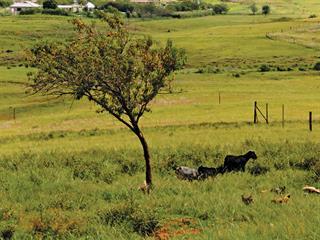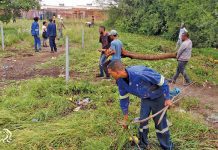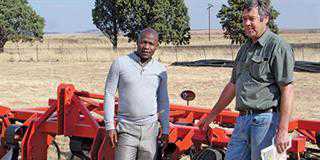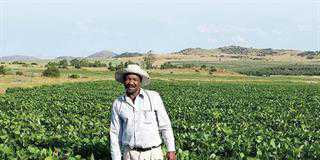
Driving through the Impendle area of rural KwaZulu-Natal, one sees peach trees growing in the yards of almost every homestead dotted across the rolling countryside. Peaches have long been an important source of nutrition for the mostly impoverished households in this traditional authority area. Now a pilot research project is investigating whether economic value can be added to these peach trees, allowing Impendle’s residents, and other residents of these traditional authority areas, to create jobs and generate income.
The project is led by Maxwell Mkhathini, a horticultural researcher specialising in fruit and vegetables, and Veli Mathe, an agricultural economist from the KZN Department of Agriculture and Rural Development (KZN DARD). As a result of the project, the 10-member Ntshishini Co-operative was formed to teach growers how to maximise the quantity and quality of their trees’ production, process peaches for added value, market peach products, and manage the co-op’s finances to achieve sustainability and profit.
Maxwell stresses, however, that horticultural crop production assistance is available to all KZN farmers. “Small-scale peach growers in KZN currently lose a significant portion of their crop because growers don’t have the capacity and resources to harvest and process all the fruit in the relatively short two-and-a-half-month harvesting season. Pests and diseases attack the fresh peaches if they’re not harvested on time.
“The best solution is to harvest the peaches early and then process them so they can be stored for longer,” Maxwell explains.
Residents of Impendle do not have proper storage facilities or access to formal markets to market the fresh peaches before they spoil. But in future, the dates on which Impendle’s peaches become ready for harvest every year will be determined so that locals can process the fruit further.

From left: Thandi Zuma, Phumzile Zuma and Roseline Ngobese, all members of the Ntshishini Co-operative. The women grow various crops, including peaches, to help feed their families.
South Korean experience
KZN DARD launched the project after officials attended the Horticultural Crop and Technology for Rural Development training workshop in South Korea in 2012. At the workshop it was reported that community members fed themselves and generated income by working together, in what the South Koreans termed a ‘green revolution’.
According to Maxwell, there are two peach landraces grown in Impendle, known locally as ‘white’ and ‘yellow’. These are grown in communal areas stretching from the uThukela District Municipality in the north, to the Kokstad area in the south. He thinks it is possible that more peaches are grown in the small-scale farming sector than the commercial farming sector in KZN.
“A small percentage of peaches in Impendle ripen in late December/early January. The majority ripen from early February to mid-March,” he says.
As a result, almost everyone in the area has peaches available at the same time, leading to overwhelming oversupply. Due to the residents’ lack of processing skills and equipment, most of the crop is lost due to spoilage.
“Leaving the fruit on the trees long past their physiological maturity also vastly reduces their shelf-life,” he explains. The KZN DARD has a working relationship with the University of KZN’s bioresources, engineering and horticulture departments, and one of the university’s laboratories. Research is currently being done on the traits of these cultivars to determine the value-adding processes each will be best suited to.
Peach tradition
According to one elderly member of the co-op, Sibongile Vilakazi, her family has about 20 peach trees. They planted the oldest 18 years ago when they moved onto the land allocated to them by the local iNkosi in 1997. “We eat our peaches fresh and also boil and bottle them for eating later on special occasions,” she says. “Sometimes vehicles that pass by on the road see our peaches and stop to buy some.
“The problem is that many of our peaches go to waste because we can’t pick and use them all when they’re ready for harvesting. The fruit are also often quite small, and they’re damaged by sunburn, pests and diseases. There’s nowhere to buy chemicals here, the chemicals are expensive, and we wouldn’t even know how to use them.”
Maxwell is now providing training to co-op members and other local residents on how to prune trees so that they produce larger peaches. He says that he has already noticed an improvement in the size of some of Sibongile’s peaches during the past fruiting season.
Co-op members also recently visited KZN DARD’s horticulture section at Cedara to receive training on how to handle fruit post-harvest and the use of sensory analysis to determine when peaches are ready for harvesting. They also viewed video clips on different fruit processing methods.
“We have no proper equipment to test the quality of our peaches yet. The training showed us how to use our senses, especially taste, to tell when our peaches are ready for harvesting,” says co-op member, Roseline Ngobese. Maxwell says that if the co-op shows commitment to follow his advice, and is able to source government and/or private sector funding to develop a centralised peach processing facility, he will arrange for project participants to be trained in the use of equipment.
These include a firmometer to measure fruit firmness, a refractometer to measure the sucrose (Brix) content, and a pH meter to measure acidity. Colour charts that will help determine specific harvesting dates will also be introduced in the future.
Maxwell is currently conducting research on production and post-harvest fruit handling for the co-op and other peach tree owners. Veli takes care of the business side of things. He trains co-op members in business management to help them develop a peach value-adding business plan. They also learn about appropriate product distribution networks and markets, and how to develop an overall business plan for the co-op. Veli has already helped the co-op to register with the Registrar of Co-operatives.
This registration, along with a feasible business plan, will help the co-op to approach public and private institutions for grant and/or loan funding. “About 90% of Impendle’s peach growers already add value by bottling the fruit at home in a process that includes boiling the fruit in sugar-water and keeping it in sealed bottles for up to a year,” says Maxwell.
“Another potential home value-adding method is drying peaches using solar energy. Small solar drying boxes of about 80cm x 60cm x 70cm can be made using plastic and wood. “Wood and net drying racks can also be used for drying fruit where relative humidity isn’t too high.”
For local commercial peach processing operations, the co-op will use a centralised greenhouse. Because of the summer rains, they cannot depend on open-sun drying. Maxwell explains that community peach processing facility workers will also need to be trained in how to prioritise and implement sanitation to avoid potential food poisoning and product contamination.
Ensuring a regular income
“We’re hoping that our co-op will eventually be able to generate regular income for its members instead of just having the excess peaches go to waste on the trees,” says Roseline. “There are no jobs in our community and poverty is a big problem.
“We want to grow our co-op so that it can create jobs and we can have some money to help other people, like child-headed households, in our community.”
Phone Maxwell Mkhathini on 076 440 0744, email [email protected] or visit www.kzndae.gov.za.













